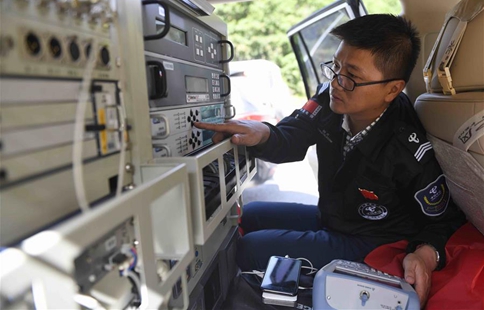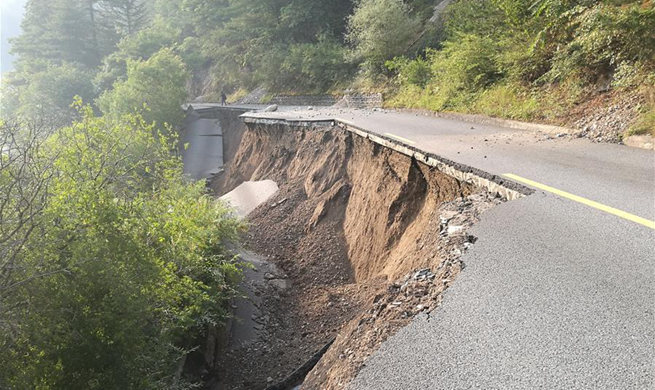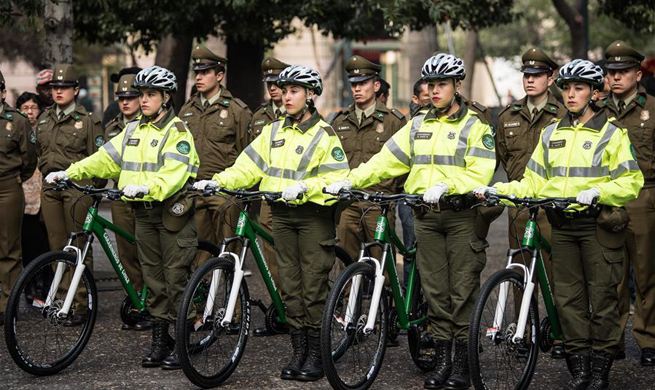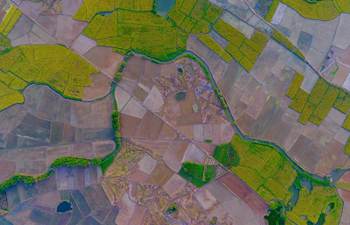BEIJING, Aug. 10 (Xinhua) -- As Chinese scientists accomplish all their planned experiments with the world's first quantum satellite, they are devising new studies and aiming to launch more quantum satellites to build a hack-proof global quantum communications network.
China launched the satellite, Quantum Experiments at Space Scale (QUESS), nicknamed "Micius" after a 5th Century B.C. Chinese philosopher and scientist, on Aug. 16, 2016.
Its three major scientific goals -- quantum key distribution, quantum entanglement distribution and quantum teleportation -- have been achieved a year ahead of schedule, and related articles have been published in academic journals Science and Nature.
Micius's designed life is two years, so Chinese scientists are making new plans for extended experiments with the satellite.
Pan Jianwei, lead scientist of QUESS and an academician of the Chinese Academy of Sciences (CAS), said they will cooperate with scientists in Europe to conduct intercontinental quantum key distribution.
Quantum key technology is used in quantum communications to make eavesdropping impossible and to perfectly secure the communication.
Scientists are conducting quantum key distribution experiments with a ground station in Graz, Austria. By the end of August, it will be able to make an intercontinental quantum secure call with a Chinese station, said Pan.
Chinese scientists also plan to conduct intercontinental quantum key distribution research with Germany and Italy. Ground stations in the two countries will be ready by the end of 2017, Pan said.
The intercontinental experiment shows Micius can work not only with Chinese facilities, but with facilities in other countries too, Pan said.
His research team is looking to integrate quantum communications with the traditional fiber network to securely transmit information and make the technology more practical.
They also plan to conduct long-distance quantum key distribution based on quantum entanglement, which will be more secure than current quantum key distribution. Pan hopes this can be achieved by the end of this year.
Their longer-term aim is to set up a global quantum communications network.
Peng Chengzhi, chief designer of the scientific application system of QUESS, said the low-earth-orbit satellite has a limited coverage area and time for each ground station. It takes several days for Micius, orbiting at an altitude of 500 kilometers, to revisit any point on earth.
"When Micius flies over China, the experiment window is about 10 minutes," said Wang Jianyu, chief commander of the satellite. "But if we have a satellite in orbit at 10,000 kilometers, the time for quantum key distribution could be several hours. And if we have a satellite in orbit at 36,000 kilometers, it can cover a third of the earth all the time.
"To increase the coverage, we plan to send satellites to higher orbits and construct a satellite constellation, which requires developing many new technologies," Wang said.
Currently, Micius can only conduct quantum communication in the earth' s shadow; that is to say, it can only work at night to avoid interference from sunlight.
However, higher-orbit satellites will spend less time in the earth's shadow. So Chinese scientists have to acquire the technology to enable space-based quantum communication in the daytime, Peng said.
Recently, Chinese scientists realized free space quantum key distribution at a distance of 53 kilometers in daytime, breaking one of the key technical barriers to a quantum satellite constellation.
"We hope to form a ground and space integrated quantum communications network in about 10 years, and apply it widely in fields such as national defense, government affairs, finance and energy, and promote the formation of emerging industries of strategic importance," said Pan. "We also hope to use space-based quantum technology to explore and examine basic physical theories such as quantum gravity."

















